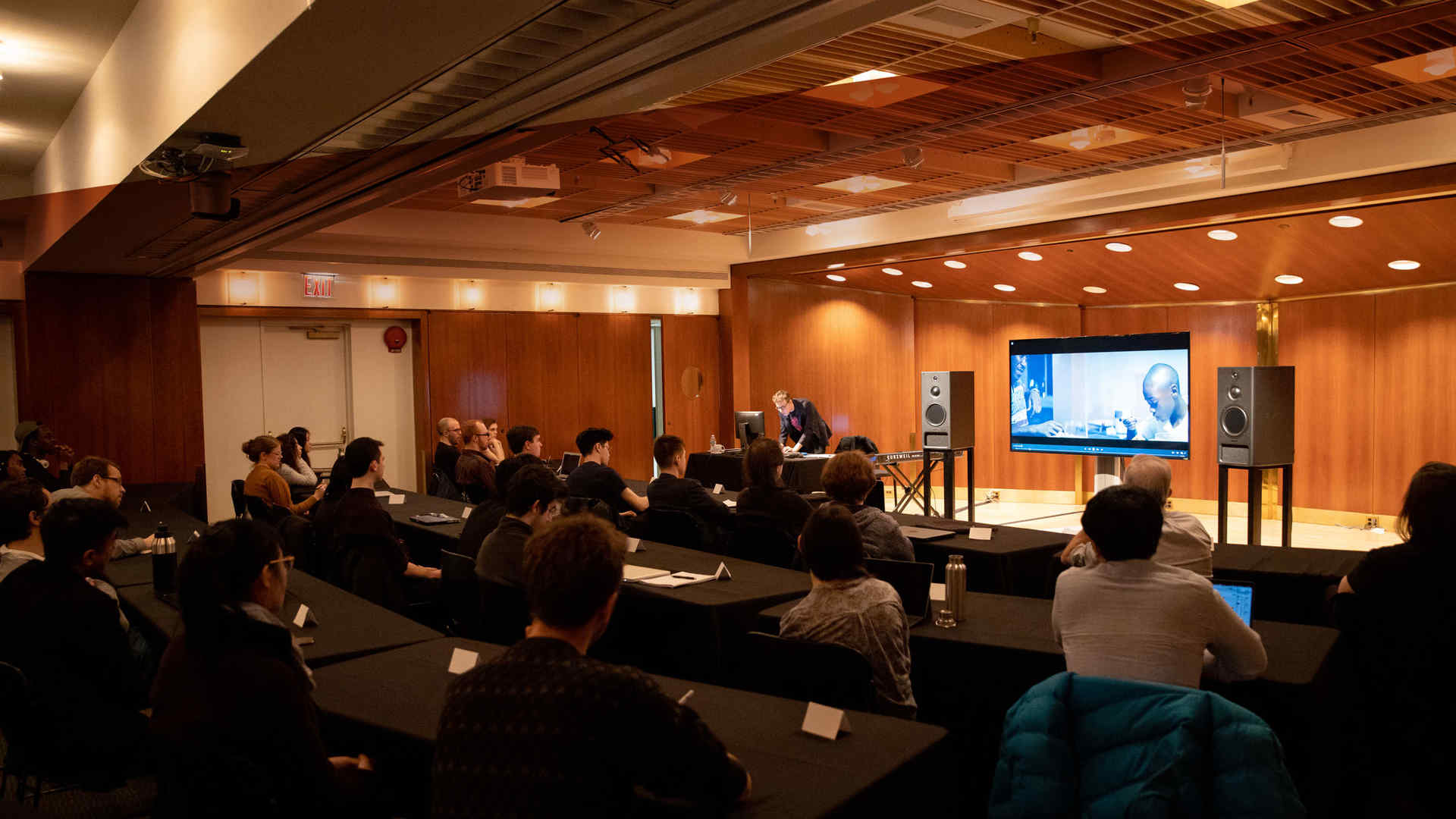
Last spring, Oscar-nominated composer and recently named Creative Associate Nicholas Britell (Pre-College '99, piano), an award-winning film composer and pianist, taught a three-day intensive on his craft. More than 40 people—including students from all divisions, alumni, and staff members—participated, and a few of them told us about their experience.
Drama alum Henry Jenkinson (Group 48)
I took part in this intensive because I’ve always been fascinated by the symbiosis between music and image in film. I wouldn’t call it a composition class as much as a class in how we tell stories collaboratively across different media and disciplines. That music was the focus was wonderful because we don’t often get the chance to sit back and appreciate it! But as actors we are constantly creating and curating stories in highly interactive contexts, so in many ways I felt right at home. The question with any film score seems to be how are we going to tell this story given the material available, and that’s exactly the same question every actor faces, just from a different vantage point.
Two of the coolest things I heard were:
- Not knowing is key to the process—very reassuring to those of us who know very little!
- The scoring process is intensely collaborative with the director and editor, and the idea of the singular solitary genius was totally debunked—it takes the combined genius of many.
Drama alumna Victoria Pollack (Group 46)
I’ve walked away from these three days feeling as though the film industry was massively demystified. I better understand how projects are produced, the many different ways producers—and other collaborators—are involved in the filmmaking process, the difference between scoring for film versus television. It’s so humbling to hear Nick talk about the ego-free nature within his collaborations: between composer and director, composer and orchestrator, composer and musicians, composer and editor, and on and on. I also loved how he likened certain scoring processes to playing jazz with the film editor. On a similar note, I appreciated how he encouraged us to work with our friends and continue to say yes to opportunities as we’re starting out. He shared some incredible anecdotes about how a humble introduction between him and some other then-twentysomethings led to some extraordinary collaborations (including Whiplash). You never know where things will go.
Angie Zhang (Pre-College ’13, BM ’17, MM ’19, piano)
I loved the cross-disciplinary aspect of this class. There were also drama and dance students who took it, and it was unbelievable to see Nick show us the breadth of his work—he is able to compose so convincingly in so many genres. I especially liked it when he went over to the Steinway D to improvise and explain what goes on inside a film composer's head. It was incredible seeing the similarity between what I do at the piano and what Britell does when approaching a new piece of music or, in his case, film. There are truly an infinite number of ways to put something together and that uncertainty and freedom is what propels me forward in my journey as an artist. It was also interesting to see how counterpoint is such a big part of what he does, and what we do. I definitely see myself analyzing film music differently as a result of taking this class. The process is truly magical and has inspired me greatly.
Evan Yionoulis, Richard Rodgers Director of the Drama Division
Nick gave everyone an invaluable sense of his process from script to final product, and it was inspiring for all of us to follow his individual creative journey with various projects and to hear about his collaborations throughout. He showed footage from some of his films (Moonlight, Vice, The Big Short) prior to the soundtrack and took us through his work on them from early drafts of the music to his demos and the final recordings made with live musicians. I so appreciated his generosity in sharing his work with us.
Philip Sheegog (BM ’17, MM ’19, cello)
I was drawn to this class not only to help inspire my own compositional explorations but also to learn from an artist who exemplifies true 21st-century artistic versatility. He took us into his own creative process, questions, mistakes, and discoveries. Film music can carry a stigma within the classical world as an industry in which artistry becomes subservient to the machine of production, but seeing Nick demonstrate complete commitment to his artistry while successfully working within that industry was inspiring!
Some of the coolest things I learned were:
- There exists a published Motion Picture Moods book with a whole curated list of compositions to be played to achieve certain emotional moods from the days of silent films.
- “Capture your first instincts,” because you only have one first look. Even if you discard the idea later, remembering the essence of your instinctual response is valuable.
- Improvising in different styles atop a blank scene is a great way to workshop ideas—just download a scene from YouTube!